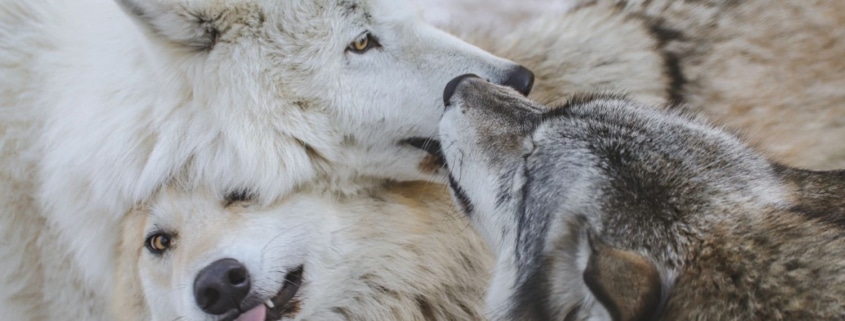Exhibit Pack Update – 23 December 2023
While the winter solstice may have passed, it doesn’t feel like winter here in Ely, Minnesota. We have had unseasonably warm temperatures with little snow accumulation. While us humans may be enjoying the lack of snow shoveling so far, the local wildlife may be impacted by the minimal snow and warmer temperatures. Deep snowpacks are beneficial to wolves in slowing down prey, aiding in their success while hunting. Ruffed grouse also rely on deep snow to roost in, creating a warm and insulated area of protection. Many species have adaptations for deep snow in northern climates, such as snowshoe hare which have large, snowshoe-like feet for traversing swiftly on top of the snow and escaping predators. Without much snow, we may see an impact on these local wildlife populations.
Here at the International Wolf Center, we are seeing mild temperaments along with the mild temperatures. This is an extremely calm pack, indicating the cohesiveness of its pack members. There are still times of heightened intensity and pack focus, all of which would fall under ritualized dominance. We continue to observe Grayson instigating a lot of social interactions with Rieka, who often responds positively with social behaviors of her own. In this week’s YouTube Update, you can see her displaying some social foreleg stabs to Grayson from atop the slate den. However, we see Caz get in the middle of Rieka and Grayson’s interactions more often than not. It appears to us that Caz, Grayson, and Rieka are the key players in the Exhibit Pack relating to pack leadership.
As also demonstrated in this week’s YouTube, Caz remains very submissive to Grayson. We often see appeasement behaviors from Caz and Blackstone to both arctics (oftentimes more well-received by Grayson); these behaviors are in part a social greeting, but appear to also pay homage to a respected packmate. The wolf care team has not seen any indication of the Caz or Blackstone testing either arctic at this point. We’ve had two-year-olds who have tested more dominant wolves in the past, but the key here is that Axel and Grayson are still relatively young. At seven and a half years of age, they continue to show the vigor and and strength of dominant pack members. This is another reason why we try to maintain a four-year rotation for wolf pups. This management strategy has been successful for IWC in the past and will likely continue into the future management of the Exhibit Pack.
We at the International Wolf Center want to wish everyone a happy holiday season and new year! While we are closed to the public this weekend, IWC staff and the wolf care team are scheduled to be onsite to oversee the Exhibit Pack and provide some extra feedings. If you are interested in directly supporting the wolf care department this season, consider checking out our Amazon Wishlist.
As also demonstrated in this week’s YouTube, Caz remains very submissive to Grayson. We often see appeasement behaviors from Caz and Blackstone to both arctics (oftentimes more well-received by Grayson); these behaviors are in part a social greeting, but appear to also pay homage to a respected packmate. The wolf care team has not seen any indication of the Caz or Blackstone testing either arctic at this point. We’ve had two-year-olds who have tested more dominant wolves in the past, but the key here is that Axel and Grayson are still relatively young. At seven and a half years of age, they continue to show the vigor and and strength of dominant pack members. This is another reason why we try to maintain a four-year rotation for wolf pups. This management strategy has been successful for IWC in the past and will likely continue into the future management of the Exhibit Pack.
We at the International Wolf Center want to wish everyone a happy holiday season and new year! While we are closed to the public this weekend, IWC staff and the wolf care team are scheduled to be onsite to oversee the Exhibit Pack and provide some extra feedings. If you are interested in directly supporting the wolf care department this season, consider checking out our Amazon Wishlist.




